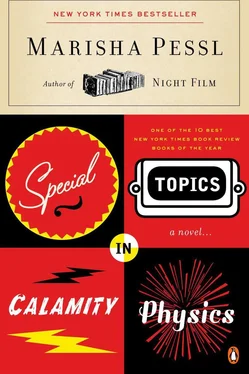“So these are the eyes of the Devil,” Dad remarked thoughtfully once, picking up and scrutinizing his own copy. “He looks out and sees you — doesn’t he?”
There was an anecdote Dad recounted like clockwork whenever he had a colleague over for dinner. Having a guest was rare, occurring only once every two or three towns in which we lived. Customarily, Dad found it difficult to withstand the echoing howls of his associates at Hattiesburg College of Arts and Science, the displays of chest-beating rampant among his Cheswick College cronies or professors at the University of Oklahoma at Flitch, eternally absorbed with feeding, grooming and being territorial to the exclusion of all else. (Dad regarded silverbacks — professors over sixty-five who had tenure, dandruff, rubbery shoes and quadrangle glasses that bugified their eyes — with particular disdain.)
Once in a while, however, under the wild oak trees, Dad bumped into his own kind (if not his exact subspecies or species, at least the same genus), a compatriot who’d made his way down from the foliage and learned to walk on two feet.
Naturally, this person never was as sophisticated an academic as Dad, nor as handsome. (The man was almost always saddled with a flattish face, an extensive, slanted forehead and an awning brow.) But Dad would cheerfully extend a Van Meer dinner invitation to this uncommonly advanced lecturer; and on a quiet Saturday or Sunday night, big, fig-eyed Professor of Linguistics Mark Hill would turn up, with his hands enduringly tucked into the patch pockets of his shapeless dinner jacket, or Associate Professor of English Lee Sanjay Song, with his quince-and-cream complexion and teeth in a traffic jam, and somewhere between the spaghetti and the tiramisu Dad treated him to the story of Tobias Jones the Damned.
It was a straightforward tale about a nervous, pale-skinned chap Dad encountered in Havana working at OPAI (Organización Panamaricana de la Ayuda Internacional) during the hot rum-soaked summer of 1983, a British kid from Yorkshire who, in the span of a single luckless week in August, lost his passport, wallet, wife, right leg and dignity — in that order. (Every now and then, to elicit even more extreme cries of amazement from his audience, Dad reduced the tragedy to a neat span of twenty-four hours.)
Never one for paying attention to physical details, Dad was disappointingly hazy on what the face of the Exceedingly Ill-fated looked like, but I was able to discern, out of Dad’s poorly lit verbal portrait, a tall, pale man with stalklike legs (after he was hit by the Packard, leg), maize-colored hair, a clammy gold pocket watch repeatedly removed from his breast pocket and blinked at disbelievingly, a propensity for sighing, for cufflinks, for lingering too long in front of the chrome metal fan (the only one in the room) and for spilling café con leche on his trousers.
Dad’s dinner guest listened in rapt attention as Dad narrated the beginning of the ill-starred week, which found Tobias showing off his new fiesta linen shirt to his coworkers at OPAI while a pack of gente de guarandabia ransacked his bungalow back at Comodoro Neptuno, all the way to the tale’s miserable end, a mere seven days later, with Tobias prostrate in his lumpy bed at el hospital Julio Trigo missing a right leg and recuperating from an attempted suicide (fortunately, the attending nurse had been able to pry him off the window ledge).
“And we never knew what happened to him,” Dad said in closing with a thoughtful sip of wine. Professor of Psychology Alfonso Rigollo stared dolefully at the edge of the dinner table. And after he muttered, “Shit,” or “Tough luck,” Dad and he would discuss predestination, or the waywardness of a woman’s love, or how Tobias might’ve had a chance for canonization if he hadn’t tried to kill himself and had stood for something. (According to Dad, Tobias had definitely performed one of the three miracles required for sainthood: back in 1979 he’d somehow convinced the ocean-eyed Adalia to marry him.)
Within twenty minutes, though, Dad would twist the conversation around to the real reason he’d brought up Tobias Jones in the first place, to detail one of his favorite theories, “The Theory of Determination,” because his final position (related with the intensity of Christopher Plummer murmuring, “The rest is silence.”) was that Tobias was not, as it might appear, a defenseless victim of fate, but a victim of himself, of his own “sallow head.”
“And thus we are faced with the simple question,” said Dad. “Is man’s destiny determined by the vicissitudes of environment or free will? I argue that it is free will, because what we think, what we dwell upon in our heads, whether it be fears or dreams, has a direct effect upon the physical world. The more you think about your downfall, your ruin, the greater the likelihood that it will occur. And conversely, the more one thinks of victory, the more likely one will achieve it.”
Dad always paused here for dramatic effect, staring across the room at the trite little daisy landscape hanging on the wall, or the pattern of horse heads and riding crops running up and down the faded dining room wallpaper. Dad adored all Suspensions and Silences, so he could feel everyone’s eyes madly running all over his face like Mongol armies in 1215 sacking Beijing.
“Obviously,” he continued with a slow smile, “it’s a concept that has been bastardized of late in Western Culture, associated with the runny-nosed Why-Nots and How-Comes of self-help and PBS marathons that drone on into the wee hours, begging you to pledge money and in return, receive forty-two hours of meditation tapes one can chant to when one is mired in traffic. Yet visualization is a concept that was once considered not so frothy, dating back to the founding of the Buddhist Mauryan Empire, around 320 B.C. History’s great leaders understood it. Niccolò Machiavelli tipped Lorenzo de’ Medici off to it, though he called it ‘prowess’ and ‘foresight.’ Julius Caesar understood it — he saw himself conquering Gaul decades before he actually did so. Who else? Hadrian, Da Vinci certainly, another great man, Ernest Shackleton — oh, and Miyamoto Musashi. Take a look at his The Book of Five Rings . Members of Nächtlich , The Nightwatchmen, also followed it, of course. Even America’s most dashing leading man, the circus-educated Archibald Leach, understood it. He is quoted, in that funny little book we have, what is it, the—”
“Talk of the Town: Hollywood Heroes Have Their Moment,” I chirped.
“Yes. He said, ‘I pretended to be somebody I wanted to be until I became that person. Or he became me.’ In the end, a man turns into what he thinks he is, however large or small. It is the reason why certain people are prone to colds and catastrophe. And why others can dance on water.”
Dad obviously thought he was one of the ones who could dance on water, because for the next hour or so, he went on to discuss his premise in meticulous detail — the necessity of discipline and reputation, the curbing of emotion and feeling, modes for quietly implementing change. (I’d sat in the wings during so many performances, I was a natural choice for the understudy, though Dad never missed a show.) Although Dad’s concert was filled with sweetness and light, none of his melodies were all that groundbreaking. He was pretty much summarizing the French ghostwritten La Grimace , a funny little book on power published in 1824. His other ideas were cherry-picked from H. H. Hill’s Napoleon’s Progress (1908), Beyond Good and Evil (Nietzsche, 1886), The Prince (Machiavelli, 1515), History Is Power (Hermin-Lewishon, 1990), obscure works like Aashir Alhayed’s The Instigations of a Dystopia (1973) and The Con Game (1989) by Hank Powers. He even referenced a few folktales by Aesop and La Fontaine.
Читать дальше












